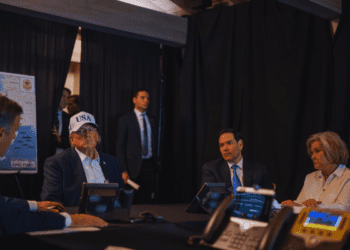Senior Fellow Ken Coates, in this op-ed for the Macdonald-Laurier Institute, argues that the BC First Nations meeting has tossed the ball firmly into the court of the provincial government.
British Columbia Premier Christy Clark met with First Nations leaders earlier this week to discuss Aboriginal issues in the wake of the Supreme Court’s Tsilhqot’in ruling, a landmark decision granting land title rights to Aboriginals.
Coates applauds Clark for taking the initiative but says that after decades of resisting Aboriginal land and resource rights the provincial government has a large breach to fill.
Coates is the co-author, along with University of Saskatchewan law professor Dwight Newman, of “The End is Not Nigh: Reason over alarmism in analysing the Tsilhqot’in decision”.
By Ken Coates, Sept. 12, 2014
No one said this would be easy. That BC has resisted Aboriginal land and resource rights for a century makes it a challenge to create trust and momentum to respond to the Supreme Court’s June Tshilqot’in decision. One meeting, even the much-anticipated BC government First Nations summit this week, was never going to be enough. The failure to agree on a post-summit communiqué reveals the gulf that remains between the two sides.
Indeed, not so long ago, BC lawyers were arguing that groups like the Tshilqot’in were not an “organized” society, a position that offended many First Nations. Members of the BC government have to demonstrate that they understand and internalize the Supreme Court judgment. It is not the First Nations’ responsibility to reach out and offer accommodation. They did so in the past and the Government did not step forward. The next step – and it has to be gracious and backed up with government-wide commitments to new relationships – rests with the Government of British Columbia. The clock is ticking.
British Columbians will have to be patient and will have to recognize the reluctance of First Nations to embrace the government’s initial proposals. For generations, First Nations believe that they had title to their lands, both under Indigenous law and under British and Canadian law. Only with the recent Supreme Court decision has Aboriginal title been established as a legal reality for non-treaty areas in Canada. One can only expect that they will move cautiously with the exercise of this new legal authority and will search very carefully for evidence of real and sustained government commitment to a new relationship with Indigenous communities. Many First Nations leaders still believe they can only achieve their goals in the courts. The province would prefer negotiation.
The Government of British Columbia, led by Premier Christy Clark, has taken valuable first steps. Addressing the historic questions of the arrest and execution of Tsilhqot’in people following the Chilcotin War 150 years ago is important. This should be done carefully, with full input from the First Nations so that the province learns more about that conflict from a symbolic level. There is important work to be done with the Tsilhqot’in people, who fought this legal battle for many years.
Province-wide, the government needs to take rapid and sincere steps to work with First Nations to understand the full implications of the Supreme Court’s decision. There is little value in resisting or arguing about what is now the law of the land. First Nations people have been very reasonable when it comes to land and resources. Most groups are looking for partnerships that share prosperity based on the wealth of the land. Resource revenue sharing, where B.C. has already made an important start, needs to be embedded in the province’s development strategy.
First Nations won an important victory with the Tsilhqot’in decision, although it has important limitations that are not well understood. BC was wrong on this issue for generations. First Nations bore the burden of that mistake. They now expect – and deserve – the opportunity for partnership. The Supreme Court expressed the hope that the decision would pave the way for real and lasting reconciliation with First Nations. It falls to BC to demonstrate that the legal decision is the launching pad for a new relationship with First Nations and not the foundation for dozens more legal cases.
Ken Coates is a Senior Fellow with the Macdonald-Laurier Institute and Canada Research Chair in Regional Innovation at the Johnson-Shoyama Graduate School of Public Policy. He is co-author of the recent “MLI report, The End is Not Nigh: Reason over alarmism in analysing the Tsilhqot’in decision”.




